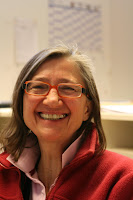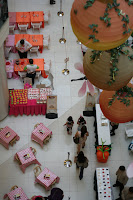

June 10th, 2011 Part1 @Poznan, Poland
One of the vendors of Gazeta Uliczna, Jacek told me that he really enjoys talking with his customers. “Some of them comes to me with loneliness. All I can do is to be all ears,” he said. “They buy the magazines to support my life, I also want to do something for them!”
He got to know his partner, Renata, at a computer workshop here. Their chatting with a big smile under a tree seems to be so “happily-ever-after" thing to me.
Lech Bor sold this magazine deligently for a long time and currently works as a leader. As a musician, his life was always close to alcohol. The former 12 therapies for alcohol addicts brought him back to the spirit again, however, after the 13th one, he visited Barka community. It really worked well and he never went back to alcohol. “I don’t want to get back to dirty alcoholic. My dream is to be sober to the very last day.”















































